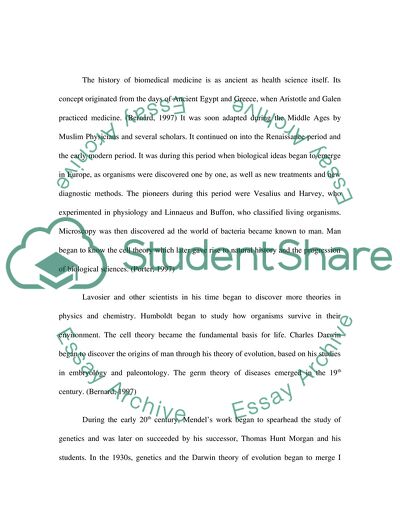
- Home
- Free Samples
- Premium Essays
- Editing Services
- Extra Tools
- Essay Writing Help
- About Us
- Studentshare
- Subjects
- Miscellaneous
- Concerning your chosen career pathway, biomedical scientists, within a public or privet industry or commercial organisation
Concerning your chosen career pathway, biomedical scientists, within a public or privet industry or commercial organisation - Essay Example

- Subject: Miscellaneous
- Type: Essay
- Level: Undergraduate
- Pages: 4 (1000 words)
- Downloads: 0
- Author: schroederbernad
Extract of sample "Concerning your chosen career pathway, biomedical scientists, within a public or privet industry or commercial organisation"
The biomedical scientist may vary in his or her workplace. He may work in a hospital laboratory, and may be called on to analyze metabolic and genetic disorders and their patterns of inheritance, perform HIV testing, blood typing or genetic tests, diagnose tumors or identify an infectious micro-organism.(WHO, 2000) In doing so, the biomedical scientist requires an understanding of medical biochemistry, microbiology, clinical and medicinal chemistry, pharmacology, cell and molecular biology, anatomy, physiology, pathology and/or cytology.
Thus it is necessary that a biomedical scientist must also be discreet, well-organized, meticulous and able to communicate his findings to doctors who prescribe treatment (Costello, 2009). This is the reason why I, as a biomedical science student, have chosen this course. I feel that biomedical scientists play a big role in society and that I have the needed skills to succeed in my chosen field. The history of biomedical medicine is as ancient as health science itself. Its concept originated from the days of Ancient Egypt and Greece, when Aristotle and Galen practiced medicine.
(Bernard, 1997) It was soon adapted during the Middle Ages by Muslim Physicians and several scholars. It continued on into the Renaissance period and the early modern period. It was during this period when biological ideas began to emerge in Europe, as organisms were discovered one by one, as well as new treatments and new diagnostic methods. The pioneers during this period were Vesalius and Harvey, who experimented in physiology and Linnaeus and Buffon, who classified living organisms. Microscopy was then discovered ad the world of bacteria became known to man.
Man began to know the cell theory which later gave rise to natural history and the progression of biological sciences. (Porter, 1997) Lavosier and other scientists in his time began to discover more theories in physics and chemistry. Humboldt began to study how
...Download file to see next pages Read More
- TERMS & CONDITIONS
- PRIVACY POLICY
- COOKIES POLICY